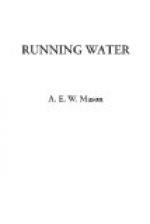“As we continued up the hill,” she resumed, “my father cut up the tobacco into small pieces with his pocket knife. ‘Why are you doing that?’ I asked, and he laughed and said, ‘Wait, you will see.’ At the top of the hill we got out of the carriage and walked across the open plateau. In front of us, rising high above a little village, stood out a hideous white building. My father asked if I knew what it was. I said I guessed.”
“It was the prison,” Chayne interrupted, quickly.
“Yes.”
“You went to it?”
Upon the answer to the question depended whether or no Chayne was to unravel his mystery, to-day.
“No,” replied Sylvia, and Chayne drew a breath. Had she answered “Yes,” the suspicion which had formed within his mind must needs be set aside, as clearly and finally disproved. Since she answered “No,” the suspicion gathered strength. “We went, however, near to it. We went as close to it as the quarries. It was five o’clock in the afternoon, and as we came to the corner of the wall which surrounds the quarries, my father said, ‘They have stopped work now.’”
“He knew that?” asked Chayne.
“Yes. We turned into a street which runs down toward the prison. On one side are small houses, on the other the long wall of the Government quarries. The street was empty; only now and then—very seldom—some one passed along it. On the top of the wall, there were sentry-boxes built at intervals, for the warders to overlook the convicts. But these were empty too. The wall is not high; I suppose—in fact my father said—the quarry was deep on the other side.”
“Yes,” said Chayne, quietly. “And then?”
“Then we walked slowly along the street, and whenever there was no one near, my father threw some tobacco over the wall. ’I don’t suppose they have a very enjoyable time,’ he said. ’They will be glad to find the tobacco there to-morrow.’ We walked up the street and turned and came back, and when we reached the corner he said with a laugh, ’That’s all, Sylvia. My pockets are empty.’ We walked back to the carriage and drove home again to Weymouth.”
Sylvia had finished her story, and the mystery was clear to Chayne. She had told him the secret which she did not know herself. He was sure now why Gabriel Strood had changed his name; he knew now why Gabriel Strood no longer climbed the Alps; and why Kenyon would answer no question as to the disappearance of his friend.
“I have told you this,” said Sylvia, “because you accused my father of unkindness and want of thought. Would you have thought of those poor prisoners over there in the quarries? If you had, would you have taken so much trouble just to give them a small luxury? I think they must have blessed the unknown man who thought for them and showed them what so many want—a little sympathy and a little kindness.”
Chayne bowed his head.
“Yes,” he said, gently. “I was unjust.”




